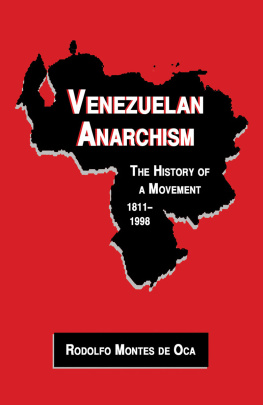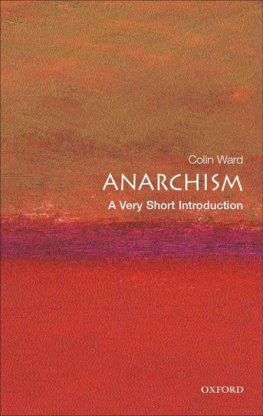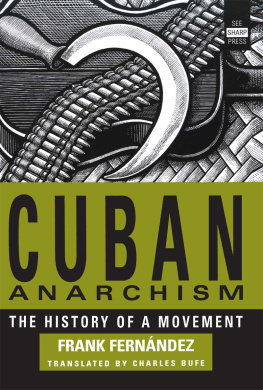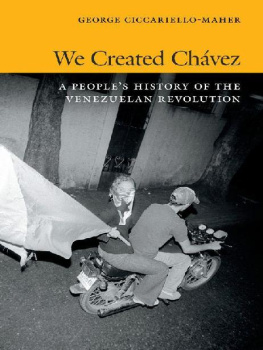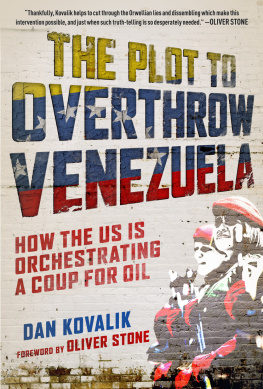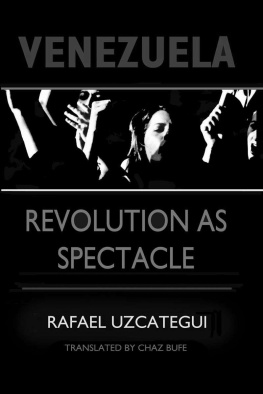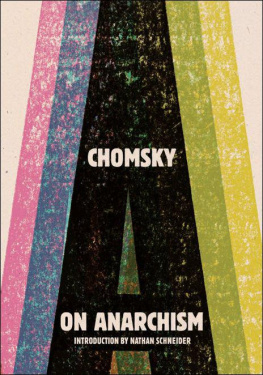I NTRODUCTION
To reclaim yesterday, to build tomorrow
The anarchist movement in Latin America has recovered the fighting and pioneering spirit of its best years. Nonetheless, despite its demonstrable expansion and ostensible rejuvenation of the groups of which its composed, and some renovation of the practices that distinguish it, its still a minority movement having much to think about, to say, and to do. An array of opportunities faces this rejuvenated movement, an array in which it can provide simultaneously a body of critical thought, a glimpse of utopia, and a day-in-day-out combative, rebellious stance that will play out in a thousand unforeseen ways.
The way forward will benefit from reclaiming our past and our historical antecedents. Its no accident, therefore, that much current Latin American anarchist study concerns the rich history that precedes us.
The reappearance of this historiagraphic, investigational approach can arbitrarily be placed in the years before the current libertarian reawakening. El anarquismo en Amrica Latina (1990), compiled and edited by Carlos Rama and ngel Capppellitti, is without doubt the as-yet-unsurpassed history of Latin American anarchisman inspired work that at the time it was published seemed to some skeptics a requiem mass, but that today can be seen as an overture to whats to come.
After that book came a raft of other more narrowly focused booksso many that its impossible to definitively inventory all of themincluding the works of Rubn Trejo, Chantal Lpez and Omar Corts in Mexico; Fernando Lpez Trujillo, Vernica Daz, and Pablo Prez in Argentina; Juan Carlos Mechoso in Uruguay; Frank Fernndez in Miami, on Cuba; scar Ortiz, Andrs Prez Gonzlez, Felipe del Solar, Alejandra Pinto, Adriana Palomera, and Daro Covarrubias in Chile; Margareth Rago in Brazil; Luis Alfonso Fajardo Snchez in Colombia; Norma Valle in Puerto Rico, and a great many others, including books that deal with forgotten feminist pioneers, books that deal with individuals, books that attempt to decipher vast collective undertakings, and others that go back to libertarian origins in centuries past or that deal with the latest trends. These in conjunction serve to reclaim and highlight a historical presence that obscurantists and authoritarians of different stripes have attempted to hide or deride.
This present work by Ricardo Montes de Oca has abundant traces of this copious production, and this in a work that deals with an anarchist movement in a land where anarchism has always appeared peripheral to the driving and loudly trumpeted nationalist movements. In this context hes unearthed an unknown history, a history that raises questioning looks, even among his countrymen. This unveiling reveals unknown sprouts from the familiar trunk of anarchism, unknown shoots that will seem strange if one considers anarchism monolithic. In addition to revealing the unknown, Rodolfos project also shows the arc of Venezuelan anarchism from its most distant antecedents to the contemporary. Its an ambitious examination that can only be compared, given the period covered, to Frank Fernndezs Cuban Anarchism: The History of a Movement.
The examination Rafael provides runs from the initial intuitions of Coto Paul near the beginning of the 19th century, through the later though not distant Proudhonist writings of Fermn Toro and Rafael Mara Baralt, through the influence Jos Bradford (an acquaintance of Proudhon) exerted upon Ezequiel Zamora. This stretch of time, which he refers to as prehistory, is not lacking in audacious concepts, which later investigations will confirm or refute.
Beginning there, Rodolfo outlines the adventures and vicissitudes of a movement that unfolded more slowly and with less energy than other similar movements in the region, a movement that was severely impeded by the dictatorships of Cipriano Castro and, for a great deal of time, Juan Vicente Gmez. A movement that existed despite inadequate cohesion, and that was later ignored by partisan historians. A movement that despite major obstacles still produced major figures and that established principles and practices that were utilized in the 20th century, in events such as the emblematic railroad strike of 1918.
Without neglecting the significance of these past events, of the continuities and discontinuities that Rafael outlines in his first chapters, perhaps the most important thing, the most significant, is what Foucault calls going back to the past to write the history of the present. Because the most outstanding thing about this text is not its recounting of the ancient pastan objective and professional recountingbut that it reveals the roots of the present crisis.
The merit of Rodolfos book consists then not in presenting us with a wax museum, but in introducing us to an indispensable historical account of the wild dance of a movement alive in the present day, an account that considers that movements possibilities and its limits, that keenly reclaims yesterday and that gives us the tools, the understanding to build tomorrow.
Daniel Barret, Montevideo, Uruguay
P REFACE
The victors write history, and to cover themselves with glory they cover the vanquished with neglect.
Elisee Reclus
In the 19th and 20th centuries the anarchist movement was a revolutionary expression of labor, student, and cultural struggles, designed to lead to a more just, more egalitarian world; it was designed to lead to a world without the state, and without capitalism. The anarchist political current was influential in lands such as Mexico, Cuba, Argentina, Uruguay, Chile, the United States, Russia, France, Greece, Spain, and Italy. But in Venezuela, that bucolic, religious, conservative strong man-oriented country, its difficult to see how it could have been influential.
But it arose, and in the long history of the republic libertarian ideas were mentioned over and over in many places and venues, and were influential in the times and struggles that gave birth to this tropical enclave known as Venezuela.
And then one must ask, What is history? One might explain it as defining (or redefining) the past of a country and the development of its people. This matter is urgent when it comes to Venezuela, not only because of its turbulent present, but also because of the uncertainty of its future. The purpose of this book is to revive the history of the Venezuelan anarchist movement, which has largely been forgotten, and when not forgotten, vilified; its intended to provide a basis for future antiauthoritarian generations of Venezuelans, a basis that will help them realize their aspirations.

